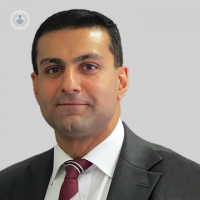Using artificial intelligence to detect oesophageal cancer
Autore:For most of us, when we think about artificial intelligence (AI) we picture a future where robots walk amongst men and where computers think like humans, but we don’t think about the less glamorous or futuristic applications for AI. One such use of AI within medicine is using AI to transform how we perform endoscopic imaging in the screening for pre-cancerous and cancerous abnormalities. Such technology presents a way to hopefully save lives by improving the detection of early oesophageal cancer. Dr Rehan Haidry is an innovative gastroenterologist and endoscopist, who is actively shaping this future of cancer detection, and here he discusses how AI fits into his field.

What are the current difficulties with detecting oesophageal cancer?
Unfortunately, oesophageal cancer is a fairly deadly disease, with a 5 year overall survival rate of about 15%. The main reason for this dismal outlook is because of the challenges we face in detecting this form of cancer in its earlier stages when we can deliver curative intervention. Unless oesophageal cancer is caught early on, it is very difficult to treat and the survival is poor for the later stages of the disease.
So, why is it difficult to diagnose early on? This is because it is generally asymptomatic until it is too late. The main symptom that brings patients to see the doctor is dysphagia (difficulty swallowing), but sadly, this is usually indicative of late-stage cancer. The only known precursor to oesophageal adenocarcinoma /cancer is Barrett’s oesophagus, which is a condition that can arise in patients with chronic acid reflux.
Read more: Dysphagia (difficulty swallowing)
If you are diagnosed with Barrett’s oesophagus, you will be enrolled to a programme where surveillance by endoscopy is carried out every 2-3 years. During these endoscopies, the doctor will look for abnormalities and changes that could indicate the development of cancer and take samples called biopsies. However, despite surveillance, abnormalities are still missed, partly due to the technology available being variable, but also down to human and sampling errors. Therefore, improved, smarter endoscopic technology is needed to improve the detection of cancer. This is where AI technologies could potentially save lives.
How early can it be detected by a specialist?
Oesophageal cancer can only be diagnosed in its pre-cancerous stage (Barrett’s) with an endoscopy, and still, this diagnosis might be missed, depending on the skill and experience of the endoscopist. If abnormalities are found, burning or cutting them for removal can be considered.
How would an AI be used in diagnosis?
When an endoscopy is performed, we are looking at the patterns in the blood vessels and the mucosa. By looking at these, we can try to determine whether or not they require a biopsy or surgery. Currently, this is done by doctors, trained in spotting these patterns and changes associated with the development of cancer. However, what AI could offer us is the ability to automate this process of detecting abnormalities and to support the essential human decision-making process faced in cancer surveillance.
In order to achieve this, we have to teach the AI what to look for. In one system, called CNN (convolutional neural networks), the system is fed thousands of images of both normal and abnormal patterns. Eventually, this trains the network to differentiate between each and it is able to detect abnormalities for the doctor to analyse in more detail. Whilst this is all still in the developmental phase, the first iterations of this technology are coming into play, but it is being used on real patients, in an academic setting, producing real outcomes.
How could this change the process by which patients are screened/diagnosis?
The main way in which AI could support the screening and diagnosis of oesophageal cancer is by helping the decision-making process. To illustrate this, when a patient has an endoscopy, the AI would guide the doctor’s eyes to possible abnormalities for further analysis. Hence, the AI is detecting red flags before the endoscopist does.
Would it be cheaper/faster/more widely available?
Using AI to smarten and improve the efficiency of endoscopic imaging of abnormalities would speed up decision-making and could be done on a real-time basis. It could also save costs on pathology reporting, and overall, it could streamline the diagnostic pathway and allow treatment to be given more quickly to the patient. This would, in theory, improve the outlook of a cancer diagnosis for patients.
Could there be a role for AI in the early detection of other diseases?
There is a lot of interest in using AI for detecting pre-cancerous abnormalities in the colon (i.e. detecting different types of colonic polyps) and so far, this has shown a lot of promise. By being able to detect polyps earlier, colorectal cancer screenings would also prove more effective, and ultimately, save more lives. It is likely that as this technology becomes more established, it will eventually become a key part of diagnostics for several diseases.
Dr Rehan Haidry is available for consultations at The London Clinic, Harley Street and King Edward VII Hospital.


